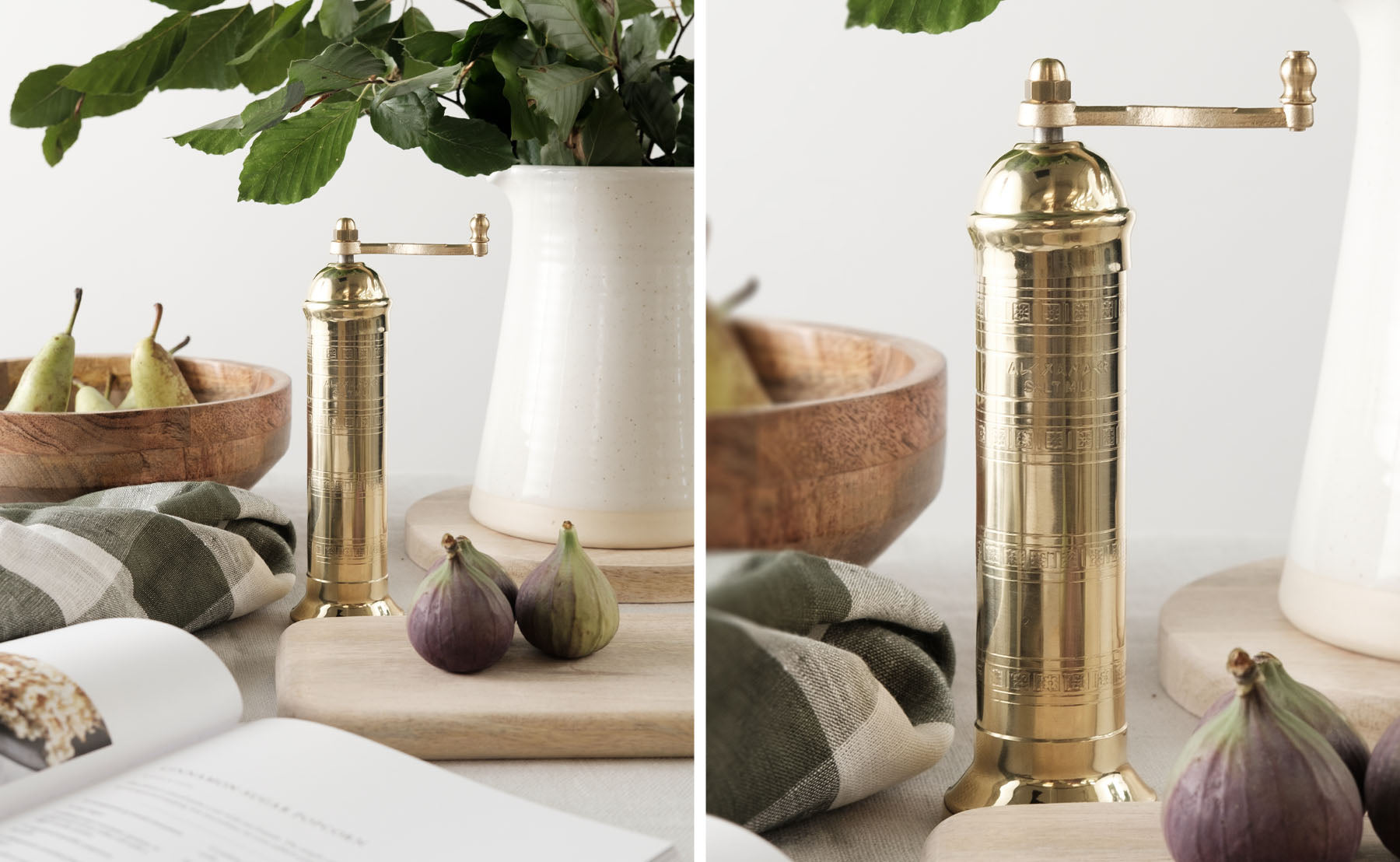Brass Salt and Pepper Mills
Undoubtedly one of our most enduringly popular product ranges is our selection of brass salt and pepper mills.
We only have to post on social media to see a flurry of sales and they are one of the products most heavily featured in social media content and imagery from our customers. So, with all of this in mind, we thought we’d share more about the brass mills from their back story and heritage to how to look after them and keep them looking peak insta-worthy!
These mills are beautiful, timeless pieces that have been handcrafted in Thessaloniki, Northern Greece, since 1977 and have been exported globally since the 1980s. Their long-standing presence all over the world, has placed them at the front of mind for both professionals and domestic customers for over 20 years. The robust design of the mills was originally based on a portable coffee mill created in the early 1900’s for Greek soldiers to use in the field; proving that classic design stands the test of time and finds new life in different forms.
Mr H. Ioannou and Mr G. Zarkadis founded the business with a single but solid objective, the production of high quality mills. Their experience as mechanical engineers and their passion for design and function led to the creation of their first traditional pepper grinder and the range has since expanded. The beautiful combination of heritage, robust functionality, high quality components, detailed finishing and the undeniable style of the final products make these Mills an irresistible finishing touch for any home kitchen or food space.
We know you don’t need any tempting when it comes to snapping up these beauties though, so let’s dive into some simple care tips to keep your brass mills in tip top condition.
Top Tips for Caring for your Brass Salt and Pepper Mills:
Your mill will need some regular care and maintenance to keep it in good working order; follow these tips and you won’t go far wrong!
Only use the mill for grinding ingredients it was intended for
The pepper mills are designed for grinding standard peppercorns, but may also be used to grind dry spices. Do not grind larger peppercorns or spices in these mills and never grind salt in a mill intended for pepper, as this will corrode the metal mechanism. Salt mills have a food safe plastic grinding mechanism and are suitable for grinding dry sea salt or rock salt. Avoid “wet” or “grey” sea salt, or salt flakes though as these will clog the mechanism.
It's important to clean the mill regularly, keep its contents fresh and avoid exposure to moisture
It's a good idea to refresh the contents of the mill regularly to avoid them becoming stale and absorbing moisture over time which will clog the mill. When refilling your salt mill, beware of any salt residue that may stick between the grinder lid and its body as this can cause severe oxidation. Before replacing the grinder cap just clean the area with a small brush and dry cloth.
Never wash the mill in water or in the Dishwasher!
Regular cleaning will help keep your mill in good working order. Take the opportunity to give the mill a clean whenever you've taken it apart to refill the contents. The mills are designed to be easily disassembled for maintenance. Take the mill apart completely to remove any contents and thoroughly clean all parts with a small brush and dry cloth. Only the plastic parts of the salt grinders can be cleaned separately in water to dissolve any clogged salt. All parts should be thoroughly clean and dry before reassembling.

Cleaning and Polishing the Exterior
Brass and copper are naturally resistant to corrosion but, like all metals, they will inevitably oxidize and change in appearance with touch and with use and through exposure to moisture and oxygen in the air. This process is part of the nature of the metal and brings with it a beauty and attractive patina of use. If you prefer to retain a bright polished look, the mills can be polished with an ordinary metal cleaner (such as Brasso) using a soft cloth to polish the outside of the mill.
Controlling Corrosion
Try and avoid exposure to moisture. Never wash or submerge the mill in water and do not wash in the dishwasher. Store the mill in a cool dry place. Exposure to moisture or humid environments may lead to more extreme corrosion such as bright green-blue to grey colorations. Corrosion may also sometimes occur inside the mill or between metal parts, for example between the lid and the body of the mill, which can be checked and cleaned when refilling the contents.

These beauties are both sturdy and stylish and will continue to be a kitchen staple for many years to come. In homage to these elegant and high functioning pieces of design genius, we thought we’d share some pictures of the mills in your homes!
Not shared yours with us yet? Just tag us on Instagram @hudsonhome_
Our Brass Mills in your homes:








Leave a comment